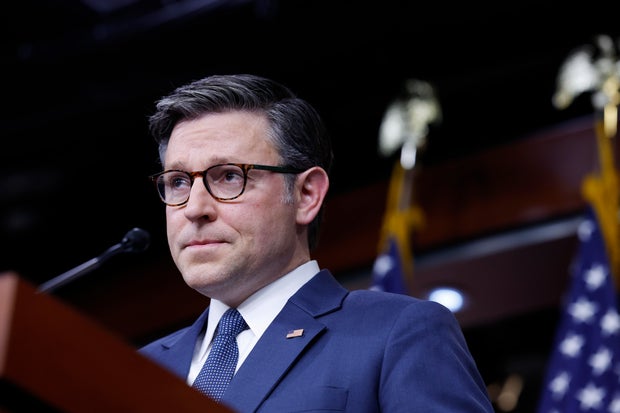Washington — The House is set to vote Wednesday on a stopgap measure to keep the government funded for three months, after Speaker Mike Johnson embraced a clean temporary funding measure that will need support from Democrats to pass.
Last week, the House rejected Johnson’s initial funding plan, which would have kept the government funded for around six months and was paired with a noncitizen voting measure that Democrats viewed as a nonstarter. After the setback, which was driven in part by his own party, the speaker said he would opt to bring up a vote on a measure to extend funding through Dec. 20 without the voting proposal, rather than risk a government shutdown weeks ahead of Election Day.
Then on Monday, Johnson was delivered another setback when the stopgap measure failed to secure enough support on the House Rules Committee, forcing House leadership to bring up the funding bill for a floor vote under suspension of the rules — a process that requires support from two-thirds of the chamber for passage.
Johnson said on Tuesday that he expects the continuing resolution to “pass by a wide margin,” while making clear that he thought “the best play under the circumstances was the CR with the SAVE Act,” referring to the voting measure.
“This was our opportunity to both vote to fund the government and ensure the security of the election, but we came a little short of the goal line,” Johnson said. “So we have to go with the last available play.”
The speaker called the legislation a “very narrow, bare bones” temporary measure. And while he noted that “we loathe [continuing resolutions] as much as anyone,” he said “it would be political malpractice to shut the government down.”
The government funding vote
Anna Moneymaker/Getty Images
The vote on the funding measure Wednesday could draw more support from Democrats than Republicans, given conservative opposition to the continuing resolution. The same dynamic has occurred in recent funding disputes, putting House Republican leadership in an uncomfortable position with their conference.
House Democratic Caucus Chair Pete Aguilar said on Tuesday that with Johnson’s move to proceed with the vote, the belief is “he has the Republicans to pass the bill,” adding that Democrats will “work in a bipartisan way to make sure that this gets done.”
The House is set to depart for a lengthy recess following the vote to keep the government funded, and won’t return until after the Nov. 5 election. And with the three-month funding measure, they’ll face a pre-holiday deadline to prevent a shutdown after their return. House Republicans have fretted about the outcome, which Congress frequently falls back upon. But Johnson said on Tuesday that House leadership opposes an omnibus funding package around the holidays.
“I have no intention of going back to that terrible tradition,” Johnson said, suggesting that he would push to approve the 12 full-year spending bills after the election.
The Senate will also need to act to prevent a shutdown ahead of the Oct. 1 deadline, assuming the House bill passes. Senate Majority Leader Chuck Schumer encouraged the House to approve the continuing resolution “quickly,” saying on Tuesday afternoon that “time is of the essence.” He outlined that the Senate will move swiftly on the stopgap measure once it passes the lower chamber to avert the shutdown threat.
“If we work together, stay away from poison pills and partisanship, we can avoid a government shutdown,” Schumer said.
